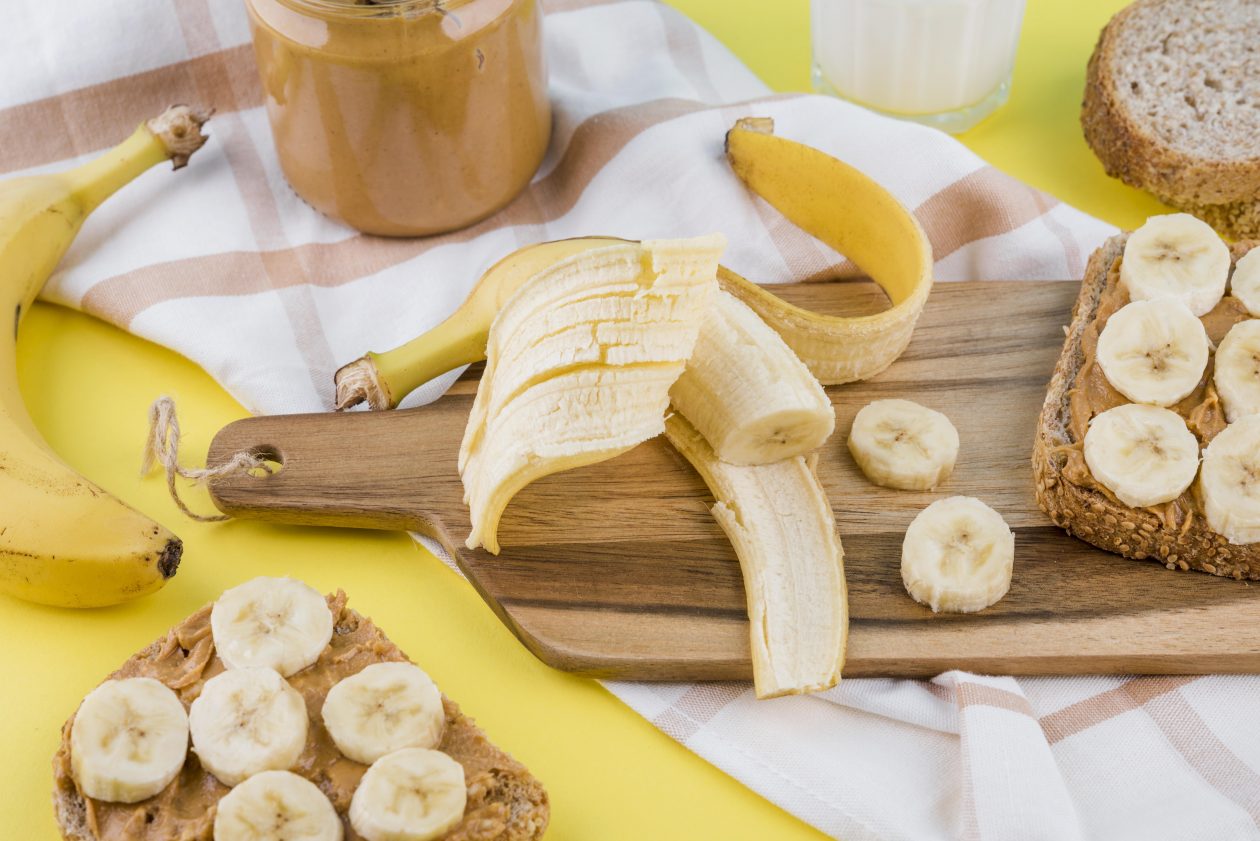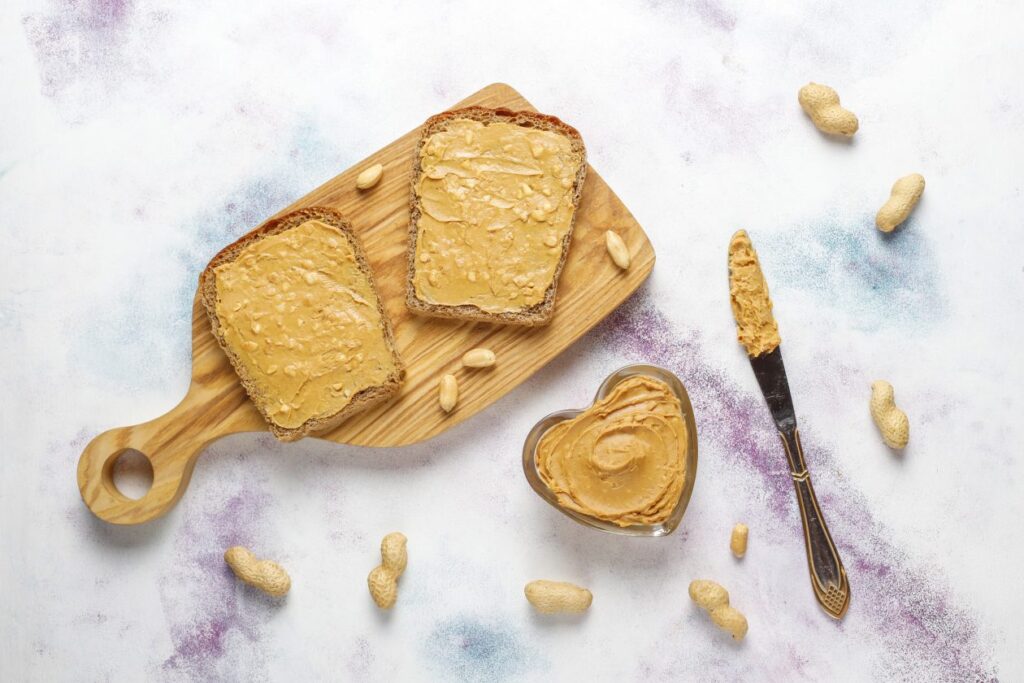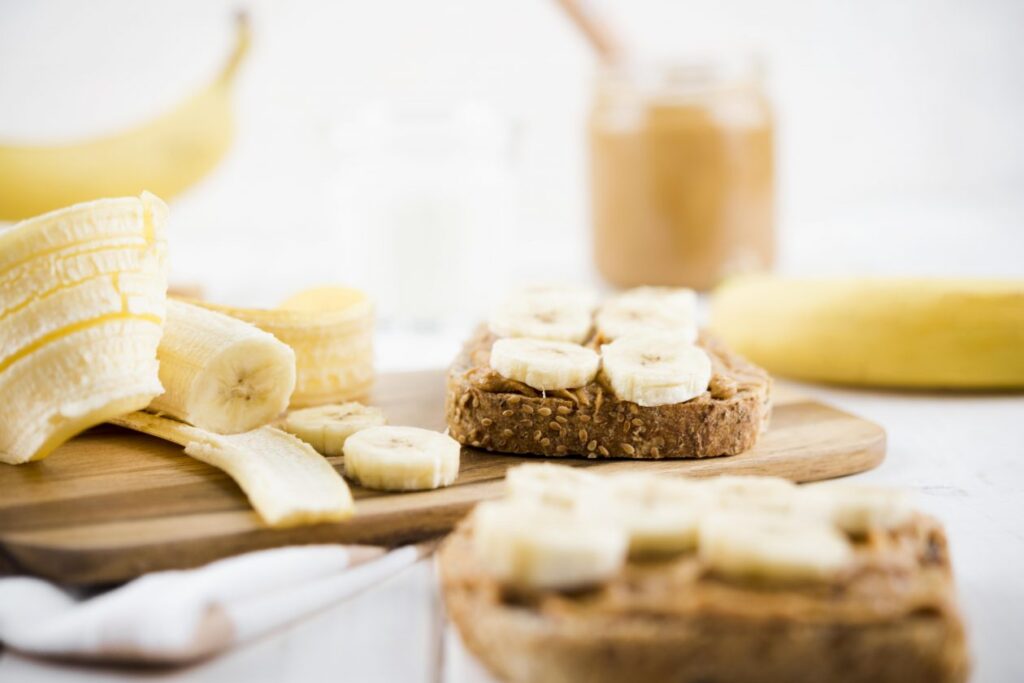Is Banana and Peanut Butter Good for Weight Loss? Benefits and Tips
 / Discover more like this here: https://stylevitally.com/is-banana-and-peanut-butter-good-for-weight-loss/?feed_id=6165&_unique_id=6606c2a86c5f6&utm_source=&utm_medium=ycfemb83&utm_campaign=FS%20Poster
/ Discover more like this here: https://stylevitally.com/is-banana-and-peanut-butter-good-for-weight-loss/?feed_id=6165&_unique_id=6606c2a86c5f6&utm_source=&utm_medium=ycfemb83&utm_campaign=FS%20Poster
Introduction
Bananas and peanut butter are esteemed components in numerous households, revered for their nutritional value, adaptability, and delectable flavor. These items are commonly integrated into various dishes, snacks, and dietary plans owing to their abundant accessibility and reasonable cost. These two components have amassed considerable renown in culinary culture, from traditional banana and peanut butter sandwiches to inventive smoothie toppings.
As individuals endeavor to embrace more nutritious dietary practices and attain their weight loss objectives, inquiries invariably emerge concerning the appropriateness of specific foods in their dietary repertoire. Among the inquiries that frequently surface is the inquiry: "Is Banana and Peanut Butter Good for Weight Loss?" This inquiry signifies a quest for transparency in the face of the vast quantity of contradictory dietary recommendations and viewpoints circulating within the wellness domain. To offer a thorough reply, we examine the nutritional compositions, potential advantages, and pragmatic factors that may be encountered when integrating peanut butter and bananas into efforts to lose weight.
Nutritional Profile of Bananas and Peanut Butter

A. Bananas:
- Carbohydrates, Fiber, and Natural Sugars: Bananas are renowned for their carbohydrate content, primarily in the form of natural sugars like glucose, fructose, and sucrose. However, they also boast a significant amount of dietary fiber, aiding digestion and promoting satiety. This combination makes bananas a satisfying and energizing snack option, particularly for those looking to manage their weight effectively.
- Key Vitamins and Minerals: Bananas are rich in essential nutrients, notably potassium, crucial in regulating blood pressure and supporting heart health. Additionally, they contain vitamin B6, necessary for metabolism and nervous system function, and vitamin C, an antioxidant that boosts immune function and collagen production.
The nutrition facts for one medium-sized banana (100 grams) are (5):
- Calories: 89
- Water: 75%
- Protein: 1.1 grams
- Carbs: 22.8 grams
- Sugar: 12.2 grams
- Fiber: 2.6 grams
- Fat: 0.3 grams
B. Peanut Butter:
- Healthy Fats, Protein, and Fiber Content: Peanut butter is renowned for its high beneficial fat content, predominantly monounsaturated and polyunsaturated fats, which contribute to heart health and promotes satiety. Moreover, it is an excellent source of plant-based protein, making it a valuable addition to vegetarian and vegan diets. Additionally, peanut butter contains dietary fiber, aiding in digestive health and promoting feelings of fullness.
- Essential Nutrients: Besides healthy fats and protein, peanut butter provides vital nutrients such as vitamin E, an antioxidant that protects cells from damage, and niacin, which supports energy production and skin health. Furthermore, it contains minerals like magnesium and phosphorus, essential for bone health and muscle function.
A 2-tablespoon (32-gram) serving of peanut butter offers (6):
- Calories: 188
- Total fat: 16 grams
- Saturated fat: 3 grams
- Carbs: 7 grams
- Fiber: 3 grams
- Protein: 8 grams
- Manganese: 29% of the Reference Daily Intake (RDI)
- Magnesium: 13% of the RDI
- Phosphorus: 10% of the RDI
- Potassium: 7% of the RDI
- Vitamin E: 10% of the RDI
- Vitamin B3 (niacin): 22% of the RDI
- Vitamin B6: 7% of the RDI
- Vitamin B9 (folate): 7% of the RDI
Benefits of Banana and Peanut Butter for Weight Loss

A. Satiety and Fullness:
- Role of Fiber and Protein: Both bananas and peanut butter are crucial in promoting feelings of fullness due to their high fiber and protein content. Fiber aids digestion and slows stomach emptying, keeping you satisfied for extended periods. Similarly, protein is known for its satiating effect, reducing hunger and cravings between meals. By incorporating bananas and peanut butter into your diet, you can effectively manage your appetite and prevent overeating, facilitating weight loss efforts.
- Studies Showing Increased Satiety: Scientific research supports that peanut butter consumption can increase satiety. A study published in the "European Journal of Nutrition" found that individuals who consumed peanuts or peanut butter as part of their breakfast experienced greater fullness and reduced calorie intake throughout the day than those who ate a lower protein breakfast. This highlights the potential of peanut butter as a valuable addition to weight loss diets, enhancing satisfaction and adherence to calorie-controlled eating plans.
B. Nutrient Density:
- Importance of Nutrient-Dense Snacks: When aiming for weight loss, it's essential to choose nutrient-dense snacks that provide necessary vitamins, minerals, and macronutrients without excessive calories. Bananas and peanut butter offer a perfect combination of nutrients, delivering a mix of carbohydrates, healthy fats, protein, vitamins, and minerals in a convenient and satisfying package. You can support your weight loss goals while nourishing your body with essential nutrients by eating nutrient-dense snacks like bananas with peanut butter.
- Contribution to Overall Nutrient Intake: Incorporating bananas and peanut butter into your diet not only aids in weight loss but also contributes to overall nutrient intake. Bananas are rich in potassium, vitamin B6, and vitamin C, while peanut butter provides essential nutrients such as vitamin E, niacin, magnesium, and phosphorus. By including these foods in your meals or snacks, you can ensure that your body receives the necessary nutrients for optimal health and well-being, making weight loss a more sustainable and nourishing journey.
In summary, bananas and peanut butter offer several benefits for weight loss, including increased satiety, nutrient density, and contribution to overall nutrient intake. By leveraging the satiating properties of fiber and protein in these foods, individuals can manage their appetite and prevent overeating, thereby supporting their weight loss efforts. Additionally, the nutrient-rich nature of bananas and peanut butter makes them valuable additions to any weight loss diet, ensuring that individuals receive essential vitamins, minerals, and macronutrients for optimal health and well-being.
Practical Considerations for Incorporating Banana and Peanut Butter

A. Portion Control:
- Caloric Content of Bananas and Peanut Butter: While bananas and peanut butter offer nutritional benefits, practicing portion control is essential when incorporating them into weight loss diets. Bananas are relatively low in calories, with an average medium-sized banana containing around 105 calories. On the other hand, peanut butter is calorie-dense due to its fat content, with two tablespoons providing approximately 190 calories. Being mindful of serving sizes can help prevent overconsumption of calories, supporting weight loss goals.
- Importance of Moderation: Despite their nutritional value, consuming excessive amounts of bananas and peanut butter can lead to an intake of surplus calories, hindering weight loss efforts. Moderation is key when enjoying these foods as part of a weight-loss diet. Opting for smaller portions and incorporating them into balanced meals or snacks can help maintain calorie control while reaping their nutritional benefits.
B. Balanced Snacking:
- Suggestions for Pairing: To maximize the nutritional benefits of bananas and peanut butter, consider pairing them with other nutritious foods. For example, you can enjoy sliced bananas with a dollop of peanut butter on whole-grain toast or mixed into Greek yogurt for added protein. Additionally, combining banana slices with peanut butter in a smoothie with spinach and almond milk can create a satisfying and nutrient-rich snack.
- Tips for Incorporating into a Balanced Diet: When incorporating bananas and peanut butter into your diet for weight loss, it's essential to prioritize balance and variety. Aim to include diverse foods from all food groups, including fruits, vegetables, whole grains, lean proteins, and healthy fats. While bananas and peanut butter can be part of a nutritious diet, they should complement other nutrient-dense foods to meet your daily nutritional requirements and support overall health and well-being.
By practicing portion control and incorporating bananas and peanut butter into balanced snacks and meals, individuals can enjoy the nutritional benefits of these foods while supporting their weight loss goals. Remember to prioritize moderation and variety in your diet to achieve long-term success and maintain overall health and wellness.
Is Banana and Peanut Butter Good for Weight Loss?
A. Short Answer:
Yes, bananas and peanut butter can benefit weight loss when consumed as part of a balanced diet and in moderation.
B. In-Depth Analysis:
Bananas and peanut butter offer several nutritional benefits that can support weight loss efforts. Bananas are rich in fiber, which aids digestion and helps promote feelings of fullness, potentially reducing overall calorie intake. Additionally, bananas contain essential vitamins and minerals, including potassium and vitamin C, necessary for overall health.
Peanut butter, on the other hand, is a good source of healthy fats, protein, and fiber, all of which contribute to satiety and help control hunger. The combination of protein and fiber in peanut butter can help stabilize blood sugar levels and prevent spikes in hunger, making it a satisfying snack choice.
When incorporating bananas and peanut butter into a weight-loss diet, it's essential to be mindful of portion sizes. While both foods offer nutritional benefits, they are also calorie-dense, so excess consumption can lead to weight gain rather than weight loss. Opt for smaller portions and pair bananas and peanut butter with other nutrient-dense foods to create balanced meals and snacks.
In summary, bananas and peanut butter can be valuable additions to a weight loss diet due to their nutrient content and ability to promote feelings of fullness and satiety. However, moderation is vital, as both foods are calorie-dense and can contribute to excess calorie intake if consumed in large quantities. By incorporating bananas and peanut butter into a balanced diet and practicing portion control, individuals can enjoy their health benefits while working towards their weight loss goals.
Other Tips for Incorporating Bananas and Peanut Butter into a Weight Loss Plan

In addition to enjoying the banana and peanut butter together, there are many other ways to incorporate these foods into a weight loss plan. For example, add sliced bananas to oatmeal or yogurt for a healthy and filling breakfast. You can also use peanut butter as a dip for fresh vegetables like carrots or celery or spread it on apple slices for a delicious and nutritious snack.
Balancing the calorie content of bananas and peanut butter with other healthy foods and exercise is essential. While these foods can benefit weight loss, eating various nutrient-dense foods and engaging in regular physical activity is still important. Additionally, portion control is critical when consuming high-calorie foods like peanut butter. One serving of peanut butter is typically two tablespoons, which contains around 190 calories.
If you're looking for other healthy snack options for weight loss, consider foods high in protein and fiber, such as nuts, seeds, and Greek yogurt. These foods can help you feel full and satisfied between meals, preventing overeating and promoting weight loss. Additionally, drink plenty of water throughout the day to stay hydrated and support healthy digestion.
In conclusion, bananas and peanut butter can be a delicious and nutritious addition to a weight loss plan. These foods are rich in nutrients like fiber, protein, and healthy fats, which can help promote feelings of fullness and aid digestion. However, it's essential to consume these foods in moderation and balance their calorie content with other healthy nutrition and exercise. With these tips and tricks, you can enjoy the benefits of banana and peanut butter while still achieving your weight loss goals.
FAQ about Bananas and Peanut Butter
Q: Is it normal to eat bananas with peanut butter?
A: Yes, eating bananas with peanut butter is quite common. This combination balances carbohydrates, protein, and healthy fats, making it a satisfying and nutritious snack.
Q: Are Bananas with Peanut Butter Healthy?
A: Absolutely! Bananas provide carbohydrates for energy, while peanut butter offers protein and healthy fats to keep you feeling full and satisfied. Combining them makes for a nutritious and delicious snack or meal option.
Q: Can I eat peanut butter to lose belly fat?
A: While peanut butter can be part of a healthy weight-loss diet due to its protein and beneficial fat content, it's essential to consume it in moderation as part of a balanced diet. Spot reduction of belly fat isn't feasible, but incorporating peanut butter into a calorie-controlled diet can support overall weight loss efforts.
Q: How many calories are in a banana with peanut butter?
A: The calorie content of a banana with peanut butter depends on the portion size. On average, a medium-sized banana contains around 105 calories, while a tablespoon of peanut butter has about 95 calories. A snack of one medium banana with one tablespoon of peanut butter would provide roughly 200 calories.
Q: Will I lose weight if I eat peanut butter every day?
A: Including peanut butter in your daily diet can support weight loss goals when consumed in moderation as part of a balanced diet. Its protein and healthy fat content help promote satiety, which may aid in controlling appetite and reducing overall calorie intake.
Q: Can I have banana and peanut butter on an empty stomach?
A: You can enjoy banana and peanut butter on an empty stomach as a nutritious and satisfying option. However, some individuals may find heavier foods less tolerable on an empty stomach, so it's essential to listen to your body and choose foods that make you feel good.
Q: What is the best snack for weight loss?
A: The best snacks for weight loss are nutrient-dense, satisfying, and portion-controlled snacks. Options like fruits, vegetables with hummus, Greek yogurt, nuts, and nut butter with whole grain crackers or fruit are excellent choices.
Q: Can I eat a banana before bed?
A: You can eat a banana before bed if it fits your diet. Bananas contain tryptophan, which can promote relaxation and better sleep quality. Additionally, they provide carbohydrates to help stabilize blood sugar levels throughout the night.
Q: Can I eat a banana at night?
A: Consuming a banana at night is generally acceptable, especially if you enjoy it as a balanced evening snack or meal. Bananas offer various nutrients and can help satisfy cravings for something sweet while providing beneficial nutrients like potassium and vitamin C.
Q: Is peanut butter good or bad for you?
A: Peanut butter can be part of a healthy diet when consumed in moderation. It contains healthy fats, protein, and essential nutrients but is also calorie-dense. Opt for natural peanut butter without added sugars or hydrogenated oils for the most beneficial option.
Q: How many calories is a banana?
A: On average, a medium-sized banana contains about 105 calories. However, the calorie content may vary slightly depending on the banana size.
Q: Is it OK to eat a peanut butter sandwich every day?
A: Eating a peanut butter sandwich daily can be part of a healthy diet, but it's essential to consider the overall balance of your diet and portion sizes. Opt for whole-grain bread and natural peanut butter, and add other nutrient-rich ingredients like sliced fruit or vegetables.
Q: Is a banana with peanut butter a good protein source?
A: While bananas and peanut butter provide some protein, they are not considered high-protein foods compared to sources like meat, fish, eggs, or legumes. However, combining them can contribute to your overall protein intake as part of a balanced diet.
Q: What does banana and peanut butter do for your body?
A: Bananas and peanut butter offer a combination of carbohydrates, protein, healthy fats, vitamins, and minerals that provide energy, support muscle function, promote satiety, and contribute to overall health and well-being.
Q: Is banana and peanut butter good after a workout?
A: A snack or meal containing banana and peanut butter can be beneficial after a workout. The carbohydrates from the banana replenish glycogen stores, while the protein in peanut butter supports muscle repair and recovery.
Conclusion
The nutrient-dense compositions and satiating qualities of bananas and peanut butter make them beneficial additions to a diet for weight loss. Peanut butter conveys healthy lipids and protein, whereas bananas are an excellent source of carbohydrates, fiber, and vital vitamins and minerals. This amalgamation may facilitate the maintenance of satiety and satiety, thereby enhancing the ability to control appetite and adhere to caloric objectives.
Beyond weight loss, incorporating bananas and peanut butter into your diet may provide numerous health benefits. Potassium, abundant in bananas, promotes cardiovascular health and muscle function. In contrast, peanut butter is fortified with vitamin E, niacin, and magnesium, all of which benefit one's overall well-being.
Although bananas and peanut butter have the potential to aid in weight loss, their consumption should be kept in check and incorporated into a well-balanced diet. It is imperative to exercise caution regarding portion sizes and monitor the total caloric content of meals and refreshments. Furthermore, for optimal results in weight loss, it is advisable to include a variety of nutrient-dense foods in your diet and maintain a consistent physical activity regimen.
Remember that achieving successful weight loss requires establishing lasting behaviors and modifying one's lifestyle. Incorporate bananas and peanut butter into a balanced and varied diet, and place the utmost importance on one's overall health and well-being. One can achieve their weight loss objectives while capitalizing on the health benefits of these nourishing foods by observing moderation and maintaining a healthy balance.
(1)Polyunsaturated Fat: Definition, Foods, Benefits, and Risks https://www.healthline.com/nutrition/polyunsaturated-fat#what-are-they.
(2) Is Peanut Butter Good or Bad for Your Health? https://www.healthline.com/nutrition/is-peanut-butter-bad-for-you
(3) Food-Features/Bananas https://www.hsph.harvard.edu/nutritionsource/food-features/bananas/#:~:text=Bananas%2C%20rich%20in%20potassium%20and,4%2C700%20mg%20dietary%20potassium%20daily.
(4) Pair bananas with a 'healthy' fat or protein source https://www.medicalnewstoday.com/articles/319992#diet-and-safety-tips
(5) According to Nutritionists, Are Bananas a Healthy Snack? https://www.foodnetwork.com/how-to/packages/food-network-essentials/how-many-calories-in-a-banana
https://stylevitally.com/is-banana-and-peanut-butter-good-for-weight-loss/?feed_id=6165&_unique_id=6606c2a86c5f6&utm_source=&utm_medium=ycfemb83&utm_campaign=FS%20Poster
Comments
Post a Comment